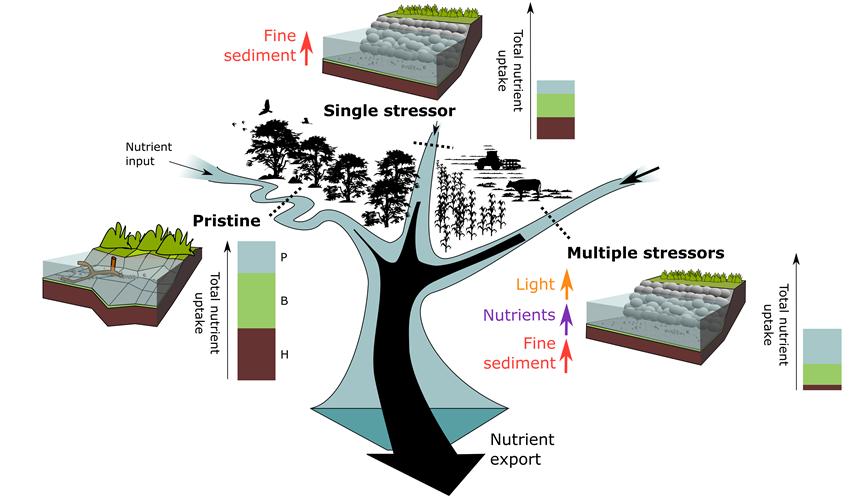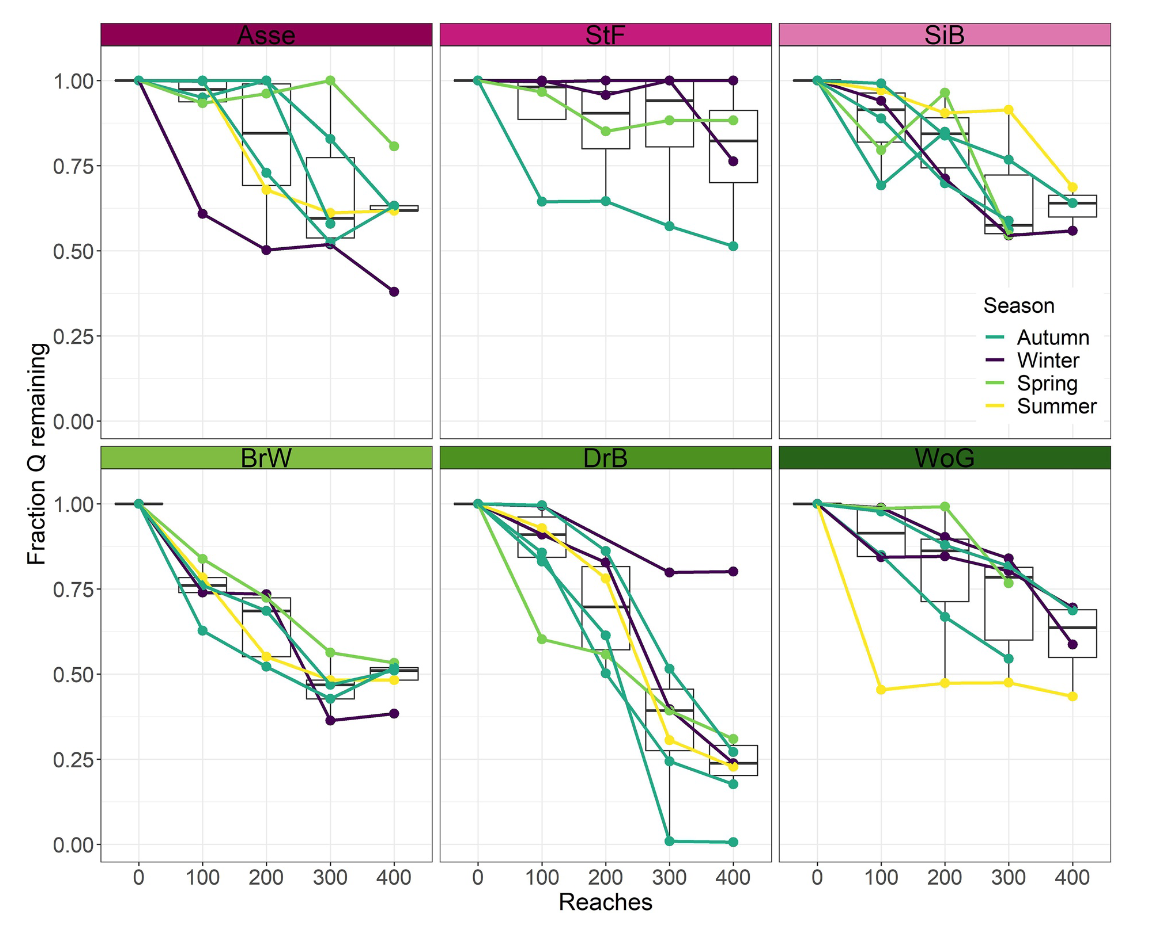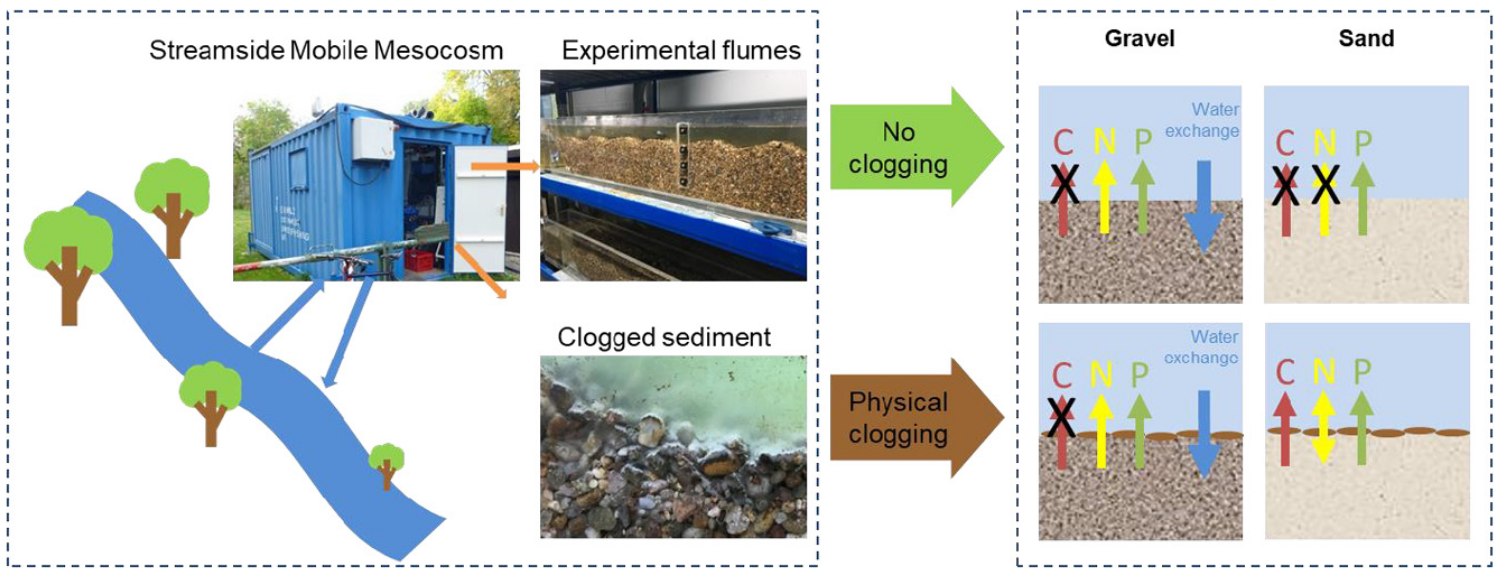inSTREAM - Linking catchment scale nutrient export to pelagic, benthic and hyporheic ecosystem functioning across stressor gradients
The PhD college of the Thematic Area Water Resources and Environment
Nutrient emissions from river catchments are still high, despite ongoing efforts to reduce loads from point-, and non-point sources. Elevated nutrient emissions impact water quality not only in the recipient streams but also pose a serious threat to downstream rivers and marine ecosystems. Reactions and biological uptake along river networks can contribute significantly to the reduction of nutrient loads. Increasing intensity of hydromorphological degradation, fine sediment inputs and nutrient inputs decrease biogeochemical reactions and biological uptake in the river network.
We hypothesize that there is a single prime stressor determining nutrient processing and that any impacts beyond that stressor will not change whole-stream nutrient uptake but will shift the relative contributions of the three main ecosystem compartments (the pelagic, benthic and the hyporheic zone).
The overarching knowledge gaps which we will tackle with this PhD college are centered around the uptake and retention of C, N and P in river networks under multiple stress. It is unknown how much each ecological compartment contributes to whole stream uptake and how multiple stress effects these contributions. We need a thorough understanding of the link between compartmental- and whole-stream nutrient uptake as well as the interplay between biological and hydrological control to predict and manage nutrient exports from catchments.
Publications
Dehaspe, J., Sarrazin, F., Kumar, R., Fleckenstein, J. H., & Musolff, A. (2021). Bending of the concentration discharge relationship can inform about in-stream nitrate removal. Hydrology and Earth System Sciences, 25(12), 6437–6463. https://doi.org/10.5194/hess-25-6437-2021
Jähkel, A., Graeber, D., Fleckenstein, J. H., & Schmidt, C. (2022). Hydrologic Turnover Matters — Gross Gains and Losses of Six First-Order Streams Across Contrasting Landscapes and Flow Regimes. Water Resources Research, 58(7), e2022WR032129. https://doi.org/10.1029/2022WR032129
Pasqualini, J., Majdi, N., & Brauns, M. (2023). Effects of incomplete sampling on macroinvertebrate secondary production estimates in a forested headwater stream. Hydrobiologia, 850(14), 3113–3124. https://doi.org/10.1007/s10750-023-05238-y
Sunjidmaa, N., Mendoza-Lera, C., Hille, S., Schmidt, C., Borchardt, D., & Graeber, D. (2022). Carbon limitation may override fine-sediment induced alterations of hyporheic nitrogen and phosphorus dynamics. Science of The Total Environment, 837, 155689. https://doi.org/10.1016/j.scitotenv.2022.155689

Research context and knowledge gaps
Processing in streams is thought to be a major control of the nutrient loads exported to the sea. However, while experimental quantification of these retention processes is bound to smaller scales, larger scale estimations mostly lack a mechanistic basis. There is a lack of hybrid approaches that use observational data to show the relevance of instream processes across stressor gradients on the one hand and that integrate this knowledge as well as knowledge gained in experiments into larger scale water quality models on the other hand.
This PhD will therefore evaluate the role and the dominant controls of in-stream processing at catchment scale across Germany utilizing data-driven methods and the UFZ water quality and quantity data set. In a second step, explorative modeling tools are used to evaluate the expected magnitude and direction of in-stream processing influence on nutrient export regimes. Finally, knowledge gained from these analyses and the analyses of the other PhDs is synthesized into a mechanistic but parsimonious model at catchment/ river network scale.
Key questions / hypothesis to be tested
What is the role of instream processing in exported nutrient loads and concentration dynamics at catchment scale?
What are the major controls of nutrient instream processing across catchments in Germany?
How can we apply the gained knowledge within integrated water quality models?
Results
Riverine nitrate uptake is a crucial element of the catchment-scale nitrogen balance and can be measured at small spatiotemporal scales, while at the scale of entire river networks, uptake measurements are rarely available. Concurrent, low-frequency nitrate concentration and streamflow observations at a basin outlet, however, are commonly monitored and can be analyzed in terms of concentration discharge (C–Q) relationships. The slopes of the log(C)–log(Q) relationship are typically steeper under low flow conditions and are considered to be linked to biological nitrate uptake, creating a bent rather than linear log(C)–log(Q) relationship.
By using a parsimonious mass-balance-based river network uptake model in 13 catchments (21–1450 km2) in central Germany the the linkages between log(C)–log(Q) bending and different model parameter combinations
The results show that uptake and transport in the river network can create bent log(C)–log(Q) relationships at the basin outlet from log log linear C–Q relationships describing the nitrate land-to-stream transfer. We find that bending is mainly shaped by geomorphological parameters that control the channel reactive surface area rather than by the biological uptake velocity itself. Further we show that in this exploratory modeling environment, bending is positively correlated to percentage of nitrate load removed in the network but that network-wide flow velocities should be taken into account when interpreting log(C)–log(Q) bending. The results can help to identify stream networks that efficiently attenuate nitrate loads based on low-frequency nitrate and discharge observations and generally show the importance of the channel geomorphology on the emerging log(C)–log(Q) bending at network scale.
Publication:
Dehaspe, J., Sarrazin, F., Kumar, R., Fleckenstein, J. H., & Musolff, A. (2021). Bending of the concentration discharge relationship can inform about in-stream nitrate removal. Hydrology and Earth System Sciences, 25(12), 6437–6463. https://doi.org/10.5194/hess-25-6437-2021
PhD student
Advisory team
Research context and knowledge gaps
Streams process large amounts of nitrogen and phosphorus by uptake and for nitrogen additionally by denitrification. However, it is not clear which ecosystem compartments (pelagial, benthal and hyporheal) contribute how much to the whole stream uptake and how the proportions of contributions change between impacted and pristine streams.
Key questions / hypothesis to be tested
1. How do the stream ecosystem compartments contribute to the total in-stream uptake of nitrogen and phosphorus?
2. How is the compartmental nutrient uptake affected by the multiple-stress situation of the stream?
Results
Streams process large amounts of nutrients, e.g., nitrogen by uptake and denitrification. Different approaches to quantify nutrient uptake exist, though they primarily treat biological activity as driving force. Hydrologic exchange, however, is known to alter stream water composition as well. Our aim was to stress the importance of gross exchange when assessing in-stream nutrient processing. Firstly, the quantification of hydrologic exchange would yield its magnitude and overall behaviour. Secondly, coupling the water mass balance with simultaneously measured solute concentrations would help to understand and quantify the hydrological and biogeochemical contributions to nutrient processing.
We evaluated roughly seven channel water balances during the hydrological year 2019 for each of six first-order streams located in the Holtemme catchment (Central Germany, three dominated by forested and three by agricultural land use). In the first part of the study, our main results showed that four of the six streams were characterized by net-losing conditions. The overall median of gross exchange was five times higher than net exchange and on average, subsurface gains replaced 50% of the original stream water over less than one kilometer of stream length. We even observed cases where over 95% of the stream water turned over within 100 m (Fig. 1).
With the second part of the study, we want to underpin the importance to include reach-scale hydrological processes in studies on nutrient spiraling. We use Monte Carlo simulations to include error estimates of the previous results and then be able to categorize mass and load balances into equilibrium, losing, and gaining states. We compare conservative and biologically active solutes to investigate their differences and detect cases of biological activity. So far, our results suggest a strong hydrologic dominance or at least, hydrological masking of biogeochemical uptake.
Publication:
Jähkel, A., Graeber, D., Fleckenstein, J. H., & Schmidt, C. (2022). Hydrologic Turnover Matters — Gross Gains and Losses of Six First-Order Streams Across Contrasting Landscapes and Flow Regimes. Water Resources Research, 58(7), e2022WR032129. https://doi.org/10.1029/2022WR032129
PhD student
Advisory team

Research context and knowledge gaps
Invertebrate consumers can affect the fate of nutrients in lotic ecosystems through indirect (e.g. ingestion) and direct (e.g. excretion) pathways (Atkinson et al. 2016). Consumer-driven nutrient cycling via excretion has received considerable attention, whereas the significance of indirect pathways is poorly known. Few studies focused on the benthic zone and the regulation of biofilms by grazer, but the role of benthic shredders as well as hyporheic consumer in controlling whole-stream- and compartmental nutrient uptake remains unclear. This PhD will elucidate how benthic and hyporheic consumer control compartmental nutrient uptake via ingestion and how whole-stream nutrient cycling is affected by nutrient excretion.
Key questions / hypothesis to be tested
How much does secondary production contribute to whole stream nutrient cycling?
How does multiple stress influence the functioning of consumers and how does its effect whole stream uptake?
Results
Estimates of secondary production in streams allow the quantification of energy flow through trophic levels. Thus, secondary production is an often used metric to assess ecosystem response to environmental changes and human stressors. The method requires an accurate collection of the abundances and body lengths of the entire macroinvertebrate community. However, the efficiency of common sampling methods in fulfilling these criteria are poorly understood.
We compared the effects of a Surber sampler (250 µm mesh size) and a Freeze corer in capturing abundance, biomass, and secondary production of macroinvertebrates in a forested headwater stream. We then examined how the use of nets with different mesh sizes could affect estimates of secondary production. Macroinvertebrate abundance was three times lower, and biomass was three times higher with the Surber than with the Freeze corer. Neither method captured the entire length distribution, and incomplete sampling of body lengths and abundance resulted in underestimating total secondary production by 48% (Surber) and 49% (Freeze corer). We estimated that reducing the mesh size from 250 to 100 µm would reduce the underestimation of production from ~ 48 to ~ 12% due to the inclusion of smaller individuals. Our results improve the efficiency of common sampling methods, allowing a reliable quantification of the role of macroinvertebrates in stream ecosystem functioning.
Publication:
Pasqualini, J., Majdi, N., & Brauns, M. (2023). Effects of incomplete sampling on macroinvertebrate secondary production estimates in a forested headwater stream. Hydrobiologia, 850(14), 3113–3124. https://doi.org/10.1007/s10750-023-05238-y
PhD student
Advisory team
Research context and knowledge gaps
Experiments help to reduce the inherent complexities of field observations. This PhD project aims on experimentally disentangling synergistic and antagonistic effects of the most relevant stressors light, nutrients and fine sediment on nutrient uptake in the three ecosystem compartments pelagial, benthal and hyporheal.
Key questions / hypothesis to be tested
1. Do the stressors interact differently on the nutrient uptake and fate in the different stream ecosystem compartments?
2. How do ecosystem structure (microbial community) and ecosystem function (nutrient uptake) respond to different stressor combinations?
3. How does interstitial nutrient uptake react to different levels of fine sedimentation?
Results
The hyporheic zone underneath stream channels is considered a biogeochemical hotspot reducing nutrient loads being transported downstream due to its high surface-to-volume ratio in combination with the hyporheic exchange. Physical clogging caused by fine sediment decreases hyporheic exchange, thus, diminishing its potential to reduce nutrient loads despite increasing its surface-to-volume ratio. Using flume experiments in the MOBICOS to systematically test the effects of fine sediment clogging for gravel and sand streambeds.
Without clogging, gravel acted as a source of nitrate-N; and both sand and gravel released SRP. Regardless of the clogging level and the resulting reduced hyporheic exchange, we found no changes in DOC and nitrate-N dynamics but net-release of ammonium-N and SRP for gravel. In contrast, in sand, physical clogging inhibited DOC release for flumes with the higher fine sediment. We propose that not physical clogging but DOC availability limited the nutrient uptake (Fig 1).
The age of hyporheic biofilms was found to play a crucial role in nutrient uptake. Biofilms that are approximately three weeks old continue to consume nitrate in environments with ample light due to algal activity. However, these biofilms release phosphate, likely due to the saturation of their cellular storage. These older biofilms consume labile protein-like organic carbon while releasing high-molecular dissolved organic matter (DOM). This suggests that these biofilms can serve as sources of refractory organic carbon, previously presumed to originate solely from terrestrial sources.
Publication:
Sunjidmaa, N., Mendoza-Lera, C., Hille, S., Schmidt, C., Borchardt, D., & Graeber, D. (2022). Carbon limitation may override fine-sediment induced alterations of hyporheic nitrogen and phosphorus dynamics. Science of The Total Environment, 837, 155689. https://doi.org/10.1016/j.scitotenv.2022.155689
PhD student
Advisory team

